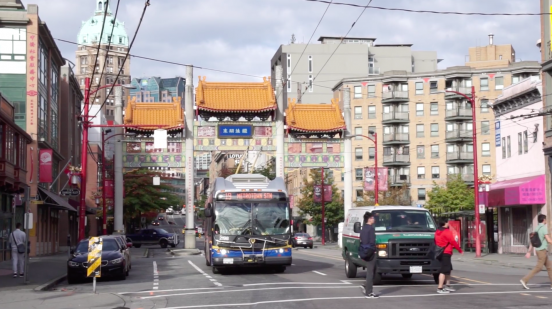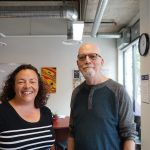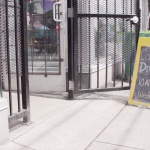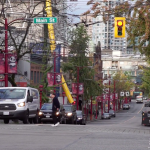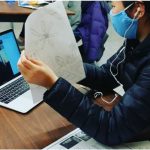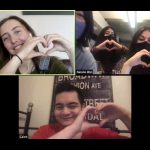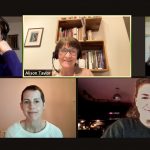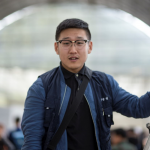Part 3 of 4. What does the Tech Cafélook like today?
By Alex Chow
On a Friday in July, when I entered the community centre in Oppenheimer Park—where the Tech Café first started—I found a mix of young and old people gathered around laptops in the room. Like Robyn, amidst the diverse mix of ages in the Café, I was unable to distinguish between the educators, volunteers, and participants. As I made the decision to observe from a distance, an older gentleman approached me somewhat cautiously and asked, in Cantonese, “Is this where you come to play with computers?” In response, I nodded, and tried my best to explain that while I understood the language and his question, I couldn’t really speak Cantonese. “I can understand Cantonese but I can’t speak it,” I say in my best attempt at the language. He seemed amused at my awkward phrasing and accent and laughed, breaking the tension. The man then pulled up a chair next to another older Chinese man with a laptop, and after some conversation in Cantonese too fast for me to follow, I saw them sharing a pair of earphones while watching a Youtube video together.
The scope of the Tech Café, I later learn, is intentionally broad and about “meeting people where they’re at,” as Dionne explains. For some, that might mean casually enjoying music videos on Youtube. For others, it may instead be about learning how to access their email or preparing a resumé. Volunteers have previously helped community members with complex tasks such as setting up websites and etsy shops, while also helping with things as simple as explaining how their new mobile phones worked and why they were missing phone calls because they did not understand that the phones came with a silent mode. “We’ve had folks who come in who are ready to throw away their brand new phones,” Dionne tells me, “all because they didn’t know that cell phones come with a silent option. And so we’ll show them how to fix that before they throw away their phone.”
These simple activities also serve to build the confidence of participants with regard to technology use. “What happens is their confidence level goes up so they can do these little tasks,” Dionne tells me. “And then they’re like, ‘Wait, I’m not too dumb to get this. I’m not too old to do this. I can do this.’” As a result, several of the participants at the Tech Café have gone on to enroll in more formal computer workshops at the UBC Learning Exchange or at Carnegie Community Centre. These workshops range from basic computer skills such as sending emails and internet navigation, to more advanced classes focusing on common software programs such as Microsoft Office. Collectively, these classes and activities aim to improve the level of digital literacy in the community.
Apart from building confidence, another goal of the Tech Café is to build a stronger relationship between the community and the university. As Robyn aptly pointed out before, the university often does not have a good reputation in communities. They are seen as exploitative in their research and prescriptive in their solutions. This results in community members harbouring a wary suspicion of universities and their programs. Some community members may also have fraught relationships with formal educational institutions due to more personal experiences with these institutions or the education system itself. These past experiences of community members and the image of the university thus manifest as barriers that continue to prevent some community members from engaging with formal educational institutions to improve their digital literacy.
To tackle this issue, Dionne emphasises the importance of having “not just one, but several positive experiences” at these informal Tech Cafés. And at these sessions, these experiences happen at the individual level. Dionne explains that as they start building individual positive relationships with community members at these sessions, “they start building trust in you and then they’ll come to the institution because you’ve invited them and then they start building trust in the institution.” By fostering these individual relationships and building trust between partners through the Tech Cafés, William and Dionne hope that they will be able to transmute that trust to the institutions that they represent, and thus foster a stronger bond between the community and the university.

William also tells me more about the program and the people who help make it happen. At today’s Tech Café, apart from Dionne and himself, there were two student volunteers from UBC. William also points out three older gentlemen as “peer educators”, members of the community who volunteer in the Tech Café to help spread their knowledge and skills with computers with the community. One of these peer educators was the older man helping the other with Youtube on his laptop. Similarly, each of the peer educators were paired with another participant at their respective stations. William points out that one of the peer educators, Danny (not his real name), was a former participant of the Tech Café himself. His journey with the program came full circle after he took three formal computer classes which led to his hiring as a peer educator today.
By empowering members of the community to take the lead in educating the community, the program avoids the pitfall of being prescriptive and paternalistic, as most university “solutions” may be or appear to be. Instead, the Tech Café ensures that the community is able to take charge of its own teaching and learning experiences.
William and Dionne also tell us about how the peer educators themselves have benefitted from the program. Over the course of the program, they have seen how the peer educators have grown as a team and as individuals. While some of them were just former participants of the Tech Café, today the peer educators organize their own shifts and set up the equipment with little help from their supervisors. “They are quite capable of setting it up and making it happen and we’ll go to join them when we’re finished talking to you,” William says. “So our presence is, I think, still important, but it’s not necessary.”
Regardless, William and Dionne remain a big part of the program, with at least one of them present at each session. The program has also continued to grow and evolve, with various community organizations partnering with William and Dionne to bring the Tech Café to their spaces. Apart from Oppenheimer Park, the Tech Cafe has also been run out of the spaces of Carnegie Learning Centre and Vancouver Public Library, to name a few.
******

